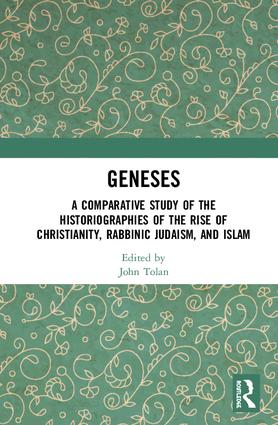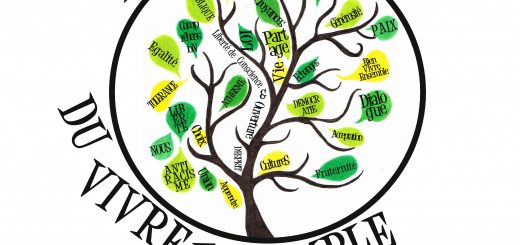Parution des actes du second colloque international de l’IPRA : Geneses / Publication of the Proceedings of the Second International IPRA Conference : Geneses
English version below
L’IPRA a le plaisir de faire part de la publication des actes de son second colloque international (à Nantes : Geneses. Étude comparée de l’historiographie de l’essor du judaïsme, du christianisme et de l’ islam, du 22 au 24 mai 2017) au éditions Routledge, sous la direction de John Tolan (246 pages). Pour plus d’informations cliquer sur ce lien :
https://www.routledge.com/Geneses-A-Comparative-Study-of-the-Historiographies-of-the-Rise-of-Christianity/Tolan/p/book/9780815362074?fbclid=IwAR1cmHPHAqUiXK99eLAl43W0C4j7zwS3amTw5rKmhqMzdTggGdVnnjipbiM
A noter que cet ouvrage est intégralement en anglais.
Résumé et table des matières de l’ouvrage :
Qu’est ce qu’une religion? Comment discernons-nous les frontières entre les religions, ou les communautés religieuses? Quand le judaïsme devient-il judaïsme, le christianisme devient-il christianisme, l’islam devient-il l’Islam ? De plus en plus, Les savants ont remis en question les discours communs des différentes doctrines, discours tenaces et uniformes illustrant cette longue et courageuse volonté de maintenir une véritable doctrine religieuse et ses véritables pratiques à travers les siècles face à l’opposition (et parfois la persécution) des hérétiques et des infidèles.
Les 11 chapitres de cet ouvrage, Geneses: A Comparative Study of the Historiographies of the Rise of Christianity, Rabbinic Judaism and Islam, écrit par un groupe de chercheurs international, spécialisés en langues, droit, fait religieux et de la culture du judaïsme, du christianisme et de l’islam primitifs, abordent ces questions par le prisme d’une étude comparée de ces discours : leur apparition au fil du temps et leur usage aujourd’hui. Ils explorent des aspects-clé de ce domaine : 1- la construction (et la déconstruction par les savants) de ces discours du triomphe (ou de la défaite) de ces religions, 2- Comment les impératifs juridiques se sont élaborés à partir de ces discours religieux et des textes sacrées et 3- les répercussions de ces questions aujourd’hui. Ainsi, ces chercheurs procèdent au développement de ce considérable corpus de recherche depuis ces trente dernières années qui a mis en lumière la malléabilité et la fluidité de ces traditions religieuses les unes par rapport aux autres et par rapport à des religions plus « païennes » et zoroastriennes et aux traditions philosophiques.
Cet ouvrage représente une contribution de valeur, une ressource précieuse et utile pour ce domaine en pleine croissance qu’est celui de l’histoire comparée des religions abrahamiques.
Tables des matières :
Introduction (John Tolan)
- Narratives of Triumph and defeat
- The Contours of Abrahamic Identity: A Zoroastrian Perspective (Yishai Kiel)
- The Twilight of the Ancient Gods (Danuta Shanzer)
- Simon the God: Imagining the Other in Second-Century Christianity (Duncan MacRae)
- Contested Ground in Gaza: Hagiography and the Narrative of Triumphalist Christianity (Claudia Rapp)
- Between Jerome and Augustine of Hippo: Some Intellectual Preoccupations of Late Antiquity (Mohamed-Arbi Nsiri)
- Forging legal paradigms
- What is ‘Islamic’ about Geonic Depictions of the Oral Torah? (Marc Herman)
- Reevaluating the Role of the Epigones (tabiʿun) in the Formation of Islamic Ritual and Jurisprudence (Mohammed Hocine Benkheira)
- Recording Debts in Sufyanid Fusṭāṭ: A Re-examination of the Procedures and Calendar in Use in the 1st/7th century (Naïm Vanthieghem)
- Marriage and Sexual Ethics: Divergence and Change in Classical Islamic Legal Texts (Karen Moukheiber)
III. Contemporary Echoes
- Teaching Early Islam: The Gap Between School and the Internet in British Schooling (Philip Wood)
- The Shahada and the Creation of an Islamic Identity (Suleiman A. Mourad)
Index
Our team is really glad to inform that the proceedings of the second international IPRA conference ( (in Nantes : Geneses. A Comparative Study of the Historiographies of the Rise of Christianity, Rabbinic Judaism and Islam , 22-24th May 2017) are published by Routledge Editions. For more information, please click on the link here :
https://www.routledge.com/Geneses-A-Comparative-Study-of-the-Historiographies-of-the-Rise-of-Christianity/Tolan/p/book/9780815362074?fbclid=IwAR1cmHPHAqUiXK99eLAl43W0C4j7zwS3amTw5rKmhqMzdTggGdVnnjipbiM
Description and table of contents:
What is a religion? How do we discern the boundaries between religions, or religious communities? When does Judaism become Judaism, Christianity become Christianity, Islam become Islam? Scholars have increasingly called into question the standard narratives created by the various orthodoxies, narratives of steadfastness and consistency, of long and courageous maintenance of true doctrine and right practice over the centuries, in the face of opposition (and at times persecution) at the hands of infidels or heretics.
The 11 chapters in this book, Geneses: A Comparative Study of the Historiographies of the Rise of Christianity, Rabbinic Judaism and Islam, written by an international group of specialists the languages, religion, law and culture of early Judaism, Christianity and Islam, tackle these questions through a comparative study of these narratives: their formation over time, and their use today. They explore three key aspects of the field: (1) the construction (and scholarly deconstruction) of the narratives of triumph (and defeat) of religions; (2) how legal imperatives are constructed from religious narratives and sacred texts; and (3) contemporary ramifications of these issues. In doing so, they tap into the significant body of research over the last 30 years, which has shown the fluidity and malleability of these religious traditions in relation to each other and to more traditional « pagan » and Zoroastrian religions and philosophical traditions.
This book represents an important contribution to, and a valuable resource for, the burgeoning field of comparative history of the Abrahamic religions.
Introduction (John Tolan)
- Narratives of Triumph and defeat
- The Contours of Abrahamic Identity: A Zoroastrian Perspective (Yishai Kiel)
- The Twilight of the Ancient Gods (Danuta Shanzer)
- Simon the God: Imagining the Other in Second-Century Christianity (Duncan MacRae)
- Contested Ground in Gaza: Hagiography and the Narrative of Triumphalist Christianity (Claudia Rapp)
- Between Jerome and Augustine of Hippo: Some Intellectual Preoccupations of Late Antiquity (Mohamed-Arbi Nsiri)
- Forging legal paradigms
- What is ‘Islamic’ about Geonic Depictions of the Oral Torah? (Marc Herman)
- Reevaluating the Role of the Epigones (tabiʿun) in the Formation of Islamic Ritual and Jurisprudence (Mohammed Hocine Benkheira)
- Recording Debts in Sufyanid Fusṭāṭ: A Re-examination of the Procedures and Calendar in Use in the 1st/7th century (Naïm Vanthieghem)
- Marriage and Sexual Ethics: Divergence and Change in Classical Islamic Legal Texts (Karen Moukheiber)
III. Contemporary Echoes
- Teaching Early Islam: The Gap Between School and the Internet in British Schooling (Philip Wood)
- The Shahada and the Creation of an Islamic Identity (Suleiman A. Mourad)
Index





